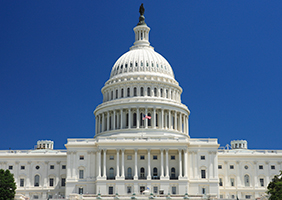Newsroom
NAFCU calls on CUs to share stories, urge end of shutdown
 As the partial government shutdown enters its second month, NAFCU has launched a new grassroots campaign that allows credit unions to directly contact their representatives and senators. NAFCU is encouraging credit unions to share how their institution is supporting members affected by the shutdown, and to also urge an end to it.
As the partial government shutdown enters its second month, NAFCU has launched a new grassroots campaign that allows credit unions to directly contact their representatives and senators. NAFCU is encouraging credit unions to share how their institution is supporting members affected by the shutdown, and to also urge an end to it.
"NAFCU realizes that the impact of this shutdown is being felt by many credit unions and their members in a number of ways," wrote Brad Thaler, NAFCU's vice president of legislative affairs, in a message to member credit unions Tuesday. "We share the sentiment with many of you that it is time to end the shutdown. I write today to ask you to share that message with your elected officials."
Thaler also highlighted credit unions' efforts to help members since the shutdown began.
"The Administration and Members of Congress have been taking notice of the good work credit unions are doing too, with many officials citing credit unions as an important option for assistance to those impacted by the shutdown," Thaler said.
Credit unions can contact their lawmakers through the association's Grassroots Action Center.
Congress and the administration remain at odds over a solution to the lapse in funding that has shuttered nine federal departments and various agencies. President Donald Trump continues to press for full funding to construct a wall along the U.S.-Mexico border.
The Democratic-controlled House has pursued piecemeal and short-term funding strategies in an attempt to reopen the government while allowing conversations on issues such as border security to continue. However, the Republican-controlled Senate has refused to take up any legislation that doesn't have the support of the president.
Tomorrow, the Senate is expected to hold two funding votes: one that would fund the departments for the rest of the fiscal year and also includes border wall funding and an extension of protection under the Deferred Action for Childhood Arrivals (DACA) program, and another that would fund the departments through Feb. 8 and includes disaster relief money. Both options would need 60 votes to advance; it is unclear that either would reach that threshold.
The president did sign legislation that would give federal workers back pay once the shutdown ends.
Share This
Related Resources
Add to Calendar 2024-06-26 14:00:00 2024-06-26 14:00:00 Gallagher Executive Compensation and Benefits Survey About the Webinar The webinar will share trends in executive pay increases, annual bonuses, and nonqualified benefit plans. Learn how to use the data charts as well as make this data actionable in order to improve your retention strategy. You’ll hear directly from the survey project manager on how to maximize the data points to gain a competitive edge in the market. Key findings on: Total compensation by asset size Nonqualified benefit plans Bonus targets and metrics Prerequisites Demographics Board expenses Watch On-Demand Web NAFCU digital@nafcu.org America/New_York public
Gallagher Executive Compensation and Benefits Survey
preferred partner
Gallagher
Webinar
Add to Calendar 2024-06-21 09:00:00 2024-06-21 09:00:00 2024 Mid-Year Fraud Review Listen On: Key Takeaways: [01:16] Check fraud continues to be rampant across the country. Card fraud is affecting everyone. [04:31] Counterfeit US passport cards are just another new toolbox in the bad actors’ toolbox. [07:21] Blocking the fallback is the only way to defeat counterfeit cards. [11:17] The best way is constant education to your members in as many channels as you can. [13:02] We are still seeing overdraft lawsuits. Make sure the programming you have at your credit union matches what you have displayed for the members. Web NAFCU digital@nafcu.org America/New_York public
2024 Mid-Year Fraud Review
Strategy & Growth, Consumer Lending
preferred partner
Allied Solutions
Podcast
Add to Calendar 2024-06-21 09:00:00 2024-06-21 09:00:00 The Evolving Role of the CISO in Credit Unions Listen On: Key Takeaways: [01:30] Being able to properly implement risk management decisions, especially in the cyber age we live in, is incredibly important so CISOs have a lot of challenges here. [02:27] Having a leader who can really communicate cyber risks and understand how ready that institution is to deal with cyber events is incredibly important. [05:36] We need to be talking about risk openly. We need to be documenting and really understanding what remediating risk looks like and how you do that strategically. [16:38] Governance, risk, compliance, and adherence to regulatory controls are all being looked at much more closely. You are also seeing other technology that is coming into the fold directly responsible for helping CISOs navigate those waters. [18:28] The reaction from the governing bodies is directly related to the needs of the position. They’re trying to help make sure that we are positioned in a way that gets us the most possibility of success, maturing our postures and protecting the institutions. Web NAFCU digital@nafcu.org America/New_York public
The Evolving Role of the CISO in Credit Unions
preferred partner
DefenseStorm
Podcast
Get daily updates.
Subscribe to NAFCU today.
